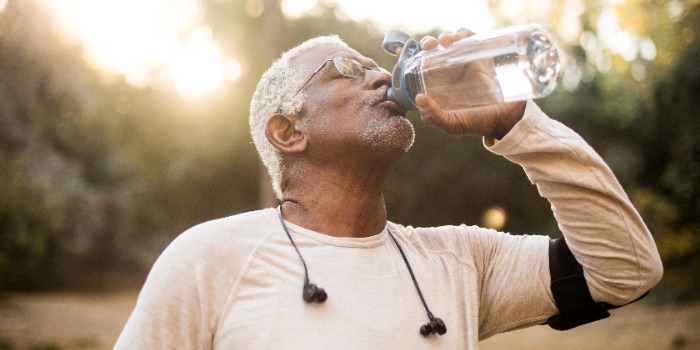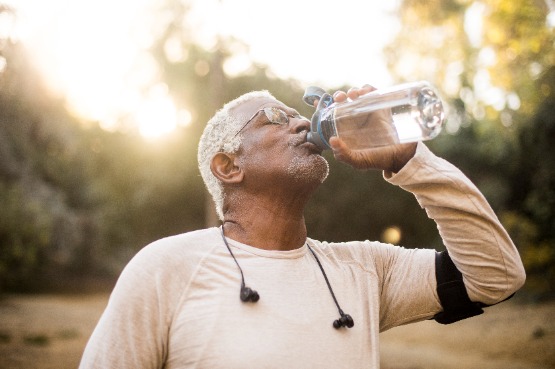What are electrolytes and why do I need them?
Electrolytes are minerals that are essential for your body to function. The main electrolytes are sodium, potassium and chloride as well as magnesium, calcium, phosphate and bicarbonates.

Why are electrolytes important?
Electrolytes are essential for basic life functions. This includes maintaining fluid balance and helping muscles and nerves to work properly. Your body works to keep electrolytes in the correct ratios. If the level of electrolytes in your body becomes too high or too low, it can disrupt normal body functions. In severe cases, this can even lead to life-threatening complications.
What is a good source of electrolytes?
You get electrolytes from foods and fluids in your diet. The main types of electrolytes include:
- potassium
- sodium
- chloride
- magnesium
- phosphate
- bicarbonates
Good sources of electrolytes include the following.
- Sodium and chloride are mostly found in your diet as salt (sodium chloride). Foods high in salt include bacon, olives, prawns, cheese, pickles and anchovies. They’re also found in some sauces, like soy sauce.
- Foods that have potassium include bananas, apricots, spinach and potatoes.
- Good sources of calcium include milk (and fortified milk alternatives), cheese, curly kale and bread made with fortified flour.
- Phosphate is found in dairy foods, meats, fish, nuts and beans.
- Good sources of magnesium include nuts, seeds, greens, whole grains, dry beans and dark chocolate.
You should be able to get all the electrolytes you need through a healthy, varied diet.
What causes an electrolyte imbalance?
Your body is very good at keeping electrolytes within the correct amounts, and your kidneys play a vital role in this. But sometimes, the balance can change, and your electrolyte levels can become too high or too low.
There can be several reasons for this. Certain medications can cause an imbalance. Or you may have an underlying health condition that affects your electrolyte levels. These conditions include:
- kidney disease
- heart failure
- diabetes
You also lose electrolytes when you sweat. So, your electrolyte level may also drop too low if you’re sweating more than usual (such as during an intense or long exercise session). Vomiting or diarrhoea can cause your electrolyte levels to drop too.
When might you need more electrolytes?
Most people should get all the electrolytes they need from a healthy, varied diet. But there are some circumstances when taking additional electrolytes may help.
This includes if you’re doing strenuous exercise, especially if it’s for longer than an hour. It’s recommended to drink water before, during and after you exercise to keep hydrated. However, if you’re exercising for longer than an hour, it’s important that you also replace the sodium that you lose through sweating. Sports drinks that contain electrolytes, including sodium and potassium, can be a useful way to replace lost electrolytes.
An electrolyte supplement may also be useful if you’ve had vomiting or diarrhoea. A doctor or pharmacist may advise you to have oral rehydration therapy, which contain electrolytes such as sodium and potassium.
These are available as solutions or powders that you mix with water.
What happens when your body is low on electrolytes?
When your body is low on electrolytes, it can lead to symptoms such as:
- weakness and fatigue
- muscle cramps
- confusion
- feeling sick
- irregular heartbeat
Remember, most of the time, our bodies keep our electrolyte levels tightly controlled and there’s no need to supplement them. But it helps to be aware of what can happen when your electrolytes are too low. You can then give your body a helping hand to restore your electrolyte balance by taking electrolyte supplements.
Even healthy people become unhealthy sometimes. Health insurance can help you get prompt access to the treatment and support you need to help you get back on the road to recovery. Learn more with our useful guide to understanding health insurance.
-
Sources Sources
- Shrimanker I, Bhattarai S. Electrolytes. StatPearls Publishing, last updated 26 July 2021
- Electrolyte and fluid balance. Oxford handbook of nutrition and dietetics (3 ed, online). Oxford Medicine Online. oxfordmedicine.com, published online April 2020
- Overview of acid-base and electrolyte disorders. BMJ Best Practice. bestpractice.bmj.com, last reviewed 16 April 2022
- Vitamins and minerals. British Nutrition Foundation. nutrition.org.uk, last reviewed June 2021
- Hydration. British Nutrition Foundation. nutrition.org.uk, last reviewed June 2021
- Orrù S, Imperlini E, Nigro E, et al. Role of functional beverages on sport performance and recovery. Nutrients. 2018;10(10):1470. Doi:10.3390/nu10101470
- Fluids and electrolytes. NICE British National Formulary. bnf.nice.org, last updated 4 April 2022
About our health information
At Bupa we produce a wealth of free health information for you and your family. This is because we believe that trustworthy information is essential in helping you make better decisions about your health and wellbeing.
Our information has been awarded the PIF TICK for trustworthy health information. It also follows the principles of the The Information Standard.

More diet and nutrition articles
Did you find our advice helpful?
We’d love to hear what you think. Our short survey takes just a few minutes to complete and helps us to keep improving our healthy lifestyle articles.
Legal disclaimer
This information was published by Bupa's Health Content Team and is based on reputable sources of medical evidence. It has been reviewed by appropriate medical or clinical professionals and deemed accurate on the date of review. Photos are only for illustrative purposes and do not reflect every presentation of a condition.
Any information about a treatment or procedure is generic, and does not necessarily describe that treatment or procedure as delivered by Bupa or its associated providers.
The information contained on this page and in any third party websites referred to on this page is not intended nor implied to be a substitute for professional medical advice nor is it intended to be for medical diagnosis or treatment. Third party websites are not owned or controlled by Bupa and any individual may be able to access and post messages on them. Bupa is not responsible for the content or availability of these third party websites. We do not accept advertising on this page.







